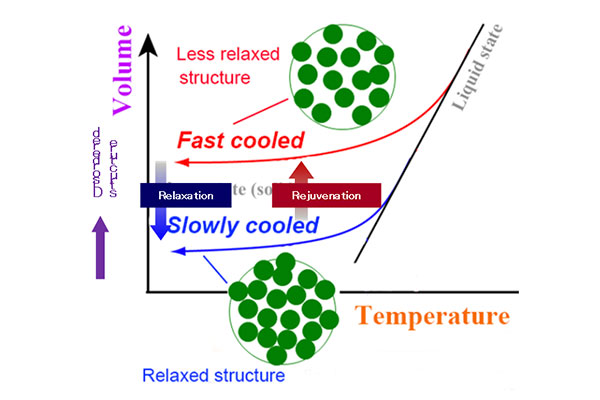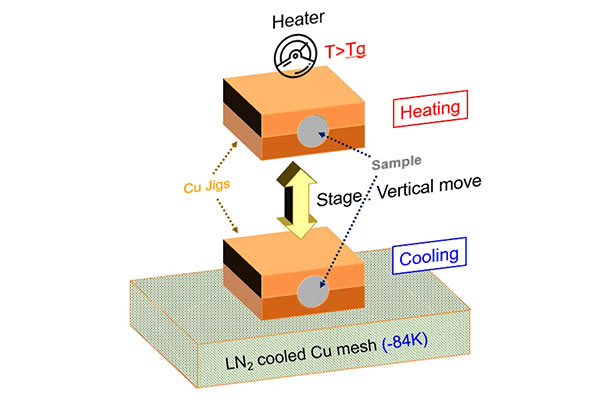Topics
Tailored Hardening of ZrCuAl Bulk Metallic Glass Induced by 2D Gradient Rejuvenation
2020.08.27
A team at FRIS have perfected a new heat treatment technique with rapid heating and asymmetrical cooling processes in metallic glass. This technique enabled the team to induce a gradient of local glassy structure, bringing an apparent work hardening behavior.
Work hardening is the process by which a material is strengthened via plastic deformation and is not generally observed in metallic glasses due to their intrinsic random structure.
Although bulk metallic glasses (BMGs) have attracted much attention owing to their high strength, wide elastic limit and excellent thermoplasticity, a major disadvantage in terms of their mechanical properties has been a lack of ductility due to an intrinsic work softening at room temperature.

A schematic illustration of metallic glass with various relaxation states depending on the cooling rate ⒸTohoku University
Dr Wookha Ryu, Assistant Professor Rui Yamada and Professor Junji Saida of the Frontier Research Institute for Interdisciplinary Sciences (FRIS) have now successfully produced unique Zr60Cu30Al10 bulk metallic glass with a 2D gradient rejuvenation state, which leads to an excellent ductility and tailored hardening of a monolithic BMG at room temperature.
"We have developed a novel structure controlling technique with asymmetric cryogenic heat treatment and produced a unique glassy structure with the 2D gradient rejuvenation state. The BMG exhibits a tailored hardening behavior throughout the overall plastic deformation stage as well as an excellent ductility at room temperature," said Professor Saida.

A schematic illustration of the asymmetrical rapid cooling methodⒸTohoku University
The local free volume concentration related to the rejuvenation state controls the shear band angle and the maximum effective shear stress. Hence, shear band propagation is prohibited and the formation of a complete shear plane transecting the whole specimen is blocked. The generation of plastic strain is accompanied by an increase in the critical shear stress, which results in a sustainable apparent hardening.
The team investigated a tailored hardening mechanism and established an experimental link between the gradient of the rejuvenation state and mechanical properties in Zr-based metallic glass.
The work was published online in NPG Asia Materials on 31 July 2020.
Press release was delivered for domestic on 18 August and for international on 27 August 2020 from Tohoku University.
Press release was delivered for domestic on 18 August and for international on 27 August 2020 from Tohoku University.
Publication Details:
W.H. Ryu, R. Yamada and J. Saida, “Tailored hardening of ZrCuAl bulk metallic glass induced by 2D gradient rejuvenation”, NPG Asia Materials, 2020
DOI: 10.1038/s41427-020-0233-8
https://www.nature.com/articles/s41427-020-0233-8
W.H. Ryu, R. Yamada and J. Saida, “Tailored hardening of ZrCuAl bulk metallic glass induced by 2D gradient rejuvenation”, NPG Asia Materials, 2020
DOI: 10.1038/s41427-020-0233-8
https://www.nature.com/articles/s41427-020-0233-8